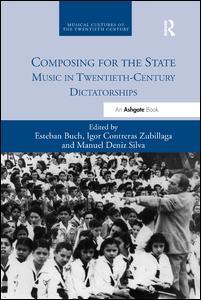Description
Composing for the State
Music in Twentieth-Century Dictatorships
Musical Cultures of the Twentieth Century Series
Coordinators: Buch Esteban, Zubillaga Igor Contreras, Deniz Silva Manuel
Language: English
Keywords
alberto; ginastera; marina; frolova; walker; symphonic; poems; jeune; france; mass; Biblioteca Nacional De Portugal; Fraga Iribarne; Marina Frolova Walker; Chopin; Musical Embodiment; La Tentation; Zunyi Conference; Pereira Da Costa; Alberto Ginastera; Zygmunt Mycielski; De La Hoz; Exhibition’s Hall; Solemn Overture; French Musical Life; Portuguese World; Portuguese Music; La Paz; Maggio Musicale; Crux Fidelis; Buenos Aires; Rimsky Korsakov; Symphonic Poem; Latin American Art Music; Barbarian Warriors; Xavier Montsalvatge
Publication date: 02-2019
· 15.6x23.4 cm · Paperback
Publication date: 01-2016
· 15.6x23.4 cm · Hardback
Description
/li>Contents
/li>Readership
/li>Biography
/li>
Under the dictatorships of the twentieth century, music never ceased to sound. Even when they did not impose aesthetic standards, these regimes tended to favour certain kinds of art music such as occasional works for commemorations or celebrations, symphonic poems, cantatas and choral settings. In the same way, composers who were more or less ideologically close to the regime wrote pieces of music on their own initiative, which amounted to a support of the political order.
This book presents ten studies focusing on music inspired and promoted by regimes such as Nazi Germany, Fascist Italy, France under Vichy, the USSR and its satellites, Franco's Spain, Salazar's Portugal, Maoist China, and Latin-American dictatorships. By discussing the musical works themselves, whether they were conceived as ways to provide "music for the people", to personally honour the dictator, or to participate in State commemorations of glorious historical events, the book examines the relationship between the composers and the State.
This important volume, therefore, addresses theoretical issues long neglected by both musicologists and historians: What is the relationship between art music and propaganda? How did composers participate in musical life under the control of an authoritarian State? What was specifically political in the works produced in these contexts? How did audiences react to them? Can we speak confidently about "State music"? In this way, Composing for the State: Music in Twentieth Century Dictatorships is an essential contribution to our understanding of musical cultures of the twentieth century, as well as the symbolic policies of dictatorial regimes.
Esteban Buch, Igor Contreras Zubillaga and Manuel Deniz Silva – ‘State Music’ and Dictatorship: an Introduction
Part 1: Music for the People
1. Yannick Simon Music and the Vichy Regime through Jeune France’s Three Joan-of-Arc Productions (1941)
2. Analía Chernavsky The ‘Dança da Terra' Issue’ (1943): Heitor Villa-Lobos and the Vargas Dictatorship
3. Hon-lun Yang Unravelling The East Is Red (1964): Socialist Music and Politics in the People’s Republic of China
Part 2: Composing for the Dictator
4. Katherine L. FitzGibbon (Lewis&Clark College, Portland) – Gottfried Müller’s Deutsches Heldenrequiem (1934): Nazi Ideology Cloaked in Historic Style
5. Justine Comtois Alfredo Casella’s Il deserto tentato (1937): an Opera Dedicated to Benito Mussolini
6. Marina Frolova-Walker A Birthday Present for Stalin: Shostakovich’s Song of the Forests (1949)
7. Andrzej Tuchowski ‘State music’ in Poland under the Stalinist Regime: Alfred Gradstein’s Cantata A Word about Stalin (1951)
Part 3: State Commemorations
8. Manuel Deniz Silva Salazar’s dictatorship and the paradoxes of State music: Luís Freitas Branco’s ill-fated Solemn Overture 1640 (1939)
9. Igor Contreras ZubillagaEl Concierto de la Paz (1964): Three Commissions to Celebrate 25 Years of Francoism
10. Esteban BuchConquistadores, Indians,and Argentine Generals: Iubilum op. 51, a Commission to Alberto Ginastera (1980).
Index
Esteban Buch is directeur d’études (full professor) at the Ecole des Hautes Etudes en Sciences Sociales (EHESS) in Paris, France. A specialist of the relationships between music and politics in the twentieth century, he is the author of O juremos con gloria morir (2013), L’Affaire Bomarzo (2011), Le cas Schoenberg (2006), La Neuvième de Beethoven (1999; English tr. 2003) and Histoire d’un secret (1994). He has also co-edited Du politique en analyse musicale (2014), Tangos cultos (2012), Réévaluer l’art moderne et les avant-gardes (2010), and La Grande guerre des musiciens (2009).
Igor Contreras Zubillaga is a PhD candidate at the Ecole des Hautes Etudes en Sciences Sociales of Paris, France, with a thesis on the Spanish musical avant-garde during Franco's dictatorship. He is co-editor of the volumes Le son des rouages:Representations des rapports homme-machine dans la musique du 20e siècle (2011) and A l'avant-garde! Art et politique dans les années 1960 et 1970 (2013).
Manuel Deniz Silva is Research Fellow at the FCSH (Universidade Nova de Lisboa, Portugal), where he coordinates the Music and Media thematic strand of the INET-md (Music and Dance Research Centre). He is co-editor of the Portuguese Journal of Musicology and editor of Kinethophone - Journal of Music, Sound and Moving Image.
These books may interest you

Music and Exile in Francoist Spain 183.14 €



